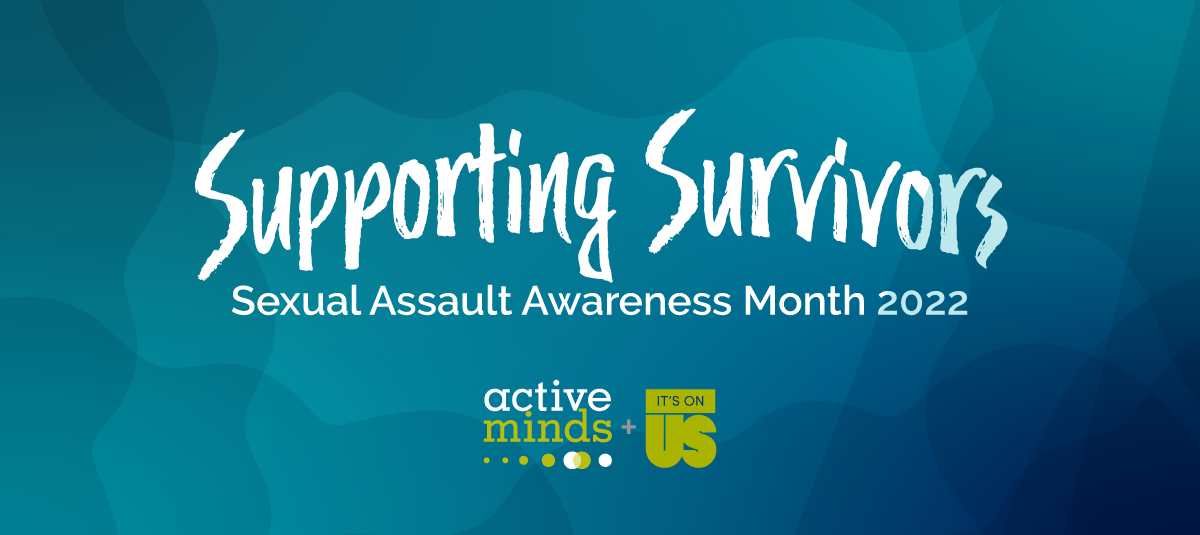When we go through trauma, it can be difficult to share our experience, either out of fear of how it will be received, a desire to not relive the incident, or even the worry of not being believed. Similarly, when we see someone we love go through something traumatic, it can be hard to know how to support them. Despite the uncomfortableness these conversations may bring, they’re necessary for supporting our mental health.
If you are a survivor of sexual assault, know that the most important thing you can do is take care of yourself. There is no right or wrong way to move forward. You may feel it’s safest to disclose to a friend, a mental health professional, or law enforcement. No matter how or with whom you chose to share your experience, the important thing is to feel that you can discuss your feelings and thoughts with someone you trust. For those of you who may know someone who is a survivor, the most important thing you can do is be there for them. It may seem scary to confront such a difficult and traumatizing topic, but simply letting someone know that you’re available can make a huge difference as we work towards preventing this from happening to others in our communities in the future.
When someone becomes a survivor, reaching out for help can be scary. Because of this, 40% of the time, a survivor will disclose to a friend or peer before they report to anyone else or through any official channels. Survivors are looking for support and comfort, and it makes sense they will seek it from those they trust. For those who are hearing the disclosure, it can be hard to know what to say. During these conversations, we encourage you to utilize V-A-R® or Validate, Appreciate, Refer®. This simple, three-step tool gives a clear path for navigating tough conversations while ensuring that you are centering the survivor’s feelings and providing support in a way that’s appropriate and helpful. Our response to survivors in both the short-term and long-term after an assault is extremely important. Even if you have not yet had a conversation like this, we encourage you to review the steps of V-A-R® and have a plan for how to respond when someone discloses a difficult situation to you.
Beyond supporting survivors one-on-one in conversations, we can also help to create a safer environment for them, as well as for all students, by advocating for survivor support on campus and learning techniques such as bystander intervention. Often, the institutional support survivors receive can greatly affect their educational journey. Currently, more than a third of survivors drop out of college after experiencing a sexual assault. What many survivors currently express experiencing is what’s called “institutional betrayal” where if a report is not handled properly by an institution, it can add additional layers of distrust and trauma from not being helped on top of the traumatic effects of a sexual assault. To counteract this, we can remind survivors that they are not alone and take action when necessary. Institutional betrayal can cause feelings of self-doubt and isolation, and by being there and advocating for someone who has experienced sexual assault, we can remind them that they belong at this institution and that we’re here for them. Tools such as the It’s On Us Organizing Toolkit can be used as a guide to advocate for bystander trainings, prevention programs, and survivor support tools to be brought to your campus. These programs can help to foster a safer environment on campus and let survivors in your community know that we see them.
Often, it can help survivors to know that action is being taken to prevent future sexual assaults. There are many ways to intervene in a way that you are comfortable with, without having to worry about causing harm to yourself. Depending on the situation, you may not want to directly intervene. In these situations, we recommend calling a friend or trusted authority for help or causing a distraction. In situations where you do feel comfortable directly intervening to stop potential harm, there are many strategies you can use. Pretend you are friends with the person in potential harm and take them aside to ask them if they are okay. You can also interject and join a conversation to make sure someone is safe if you are not sure. Remember, it is better to step in and feel embarrassed than to not and someone to be harmed. For more information about bystander techniques, click here.
We need to normalize supporting and looking out for each other. Whether it is stepping in to prevent a sexual assault or showing up to support and listen to a survivor when they seek help, we all have a role to play in changing the environment in our campus communities. By supporting survivors, we are creating a mental health culture that validates their experiences and lets them know they’re not alone. Our response to both violence and potential violence could change someone’s life.




